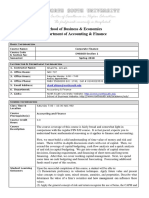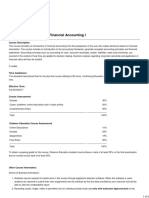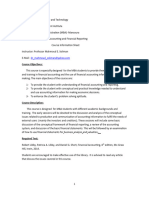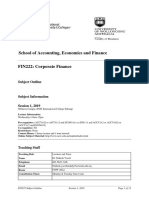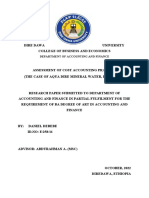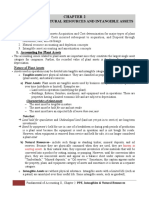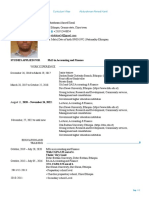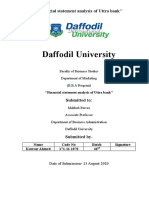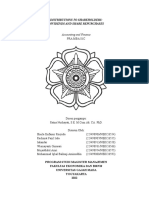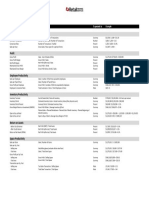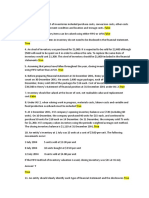0 ratings0% found this document useful (0 votes)
109 viewsFinancial Accounting 1 Course Outline
Financial Accounting 1 Course Outline
Uploaded by
Abdi Mucee TubeThis document outlines the course details for Advanced Financial Accounting I taught at Oda Bultum University. The course covers topics including income taxes, share-based compensation, agriculture, insurance contracts, and asset valuation. It is taught over 13 weeks through lectures, discussions, assignments and cases. Students will be evaluated through midterm and final exams, quizzes, and assignments. The goal is for students to gain skills in applying financial reporting standards and preparing financial statements.
Copyright:
© All Rights Reserved
Available Formats
Download as DOCX, PDF, TXT or read online from Scribd
Financial Accounting 1 Course Outline
Financial Accounting 1 Course Outline
Uploaded by
Abdi Mucee Tube0 ratings0% found this document useful (0 votes)
109 views3 pagesThis document outlines the course details for Advanced Financial Accounting I taught at Oda Bultum University. The course covers topics including income taxes, share-based compensation, agriculture, insurance contracts, and asset valuation. It is taught over 13 weeks through lectures, discussions, assignments and cases. Students will be evaluated through midterm and final exams, quizzes, and assignments. The goal is for students to gain skills in applying financial reporting standards and preparing financial statements.
Original Description:
Course outlines
Original Title
Financial Accounting 1 course outline
Copyright
© © All Rights Reserved
Available Formats
DOCX, PDF, TXT or read online from Scribd
Share this document
Did you find this document useful?
Is this content inappropriate?
This document outlines the course details for Advanced Financial Accounting I taught at Oda Bultum University. The course covers topics including income taxes, share-based compensation, agriculture, insurance contracts, and asset valuation. It is taught over 13 weeks through lectures, discussions, assignments and cases. Students will be evaluated through midterm and final exams, quizzes, and assignments. The goal is for students to gain skills in applying financial reporting standards and preparing financial statements.
Copyright:
© All Rights Reserved
Available Formats
Download as DOCX, PDF, TXT or read online from Scribd
Download as docx, pdf, or txt
0 ratings0% found this document useful (0 votes)
109 views3 pagesFinancial Accounting 1 Course Outline
Financial Accounting 1 Course Outline
Uploaded by
Abdi Mucee TubeThis document outlines the course details for Advanced Financial Accounting I taught at Oda Bultum University. The course covers topics including income taxes, share-based compensation, agriculture, insurance contracts, and asset valuation. It is taught over 13 weeks through lectures, discussions, assignments and cases. Students will be evaluated through midterm and final exams, quizzes, and assignments. The goal is for students to gain skills in applying financial reporting standards and preparing financial statements.
Copyright:
© All Rights Reserved
Available Formats
Download as DOCX, PDF, TXT or read online from Scribd
Download as docx, pdf, or txt
You are on page 1of 3
Oda Bultum University
College of Business and Economics
Department of Accounting and Finance
Courses of the Module
Advanced Financial Accounting I
Advanced Financial Accounting II
Course code ACFN4101
Course Title Advanced Financial Accounting I
Degree Program BA Degree in Accounting and Finance
Lecturer Abdurahman A. (MSc in Accounting and Finance)
information Gmail: abdukiya54@gmail.com
ETCTS Credits 5
Contact Hours 3
Course Description This course addresses the skills needed to apply some selected financial reporting standards in business
environments. The topics covered in the course include income taxes, share-based compensation,
agriculture, insurance contracts, statement of cash flows, and asset valuation.
Course Objectives In this, course students examine several complex topics and their effect on financial reporting and
disclosure. The course is designed to cover a selected group of financial accounting topics under IFRS.
Upon successful completion of this course the student will be able to:
Record, analyze and report financial information related to income taxes, biological assets, insurance
contracts, share-based compensations, and employee benefits.
Prepare and present statement of cash flows.
Undertake valuation of financial assets for financial reporting purposes.
WEEKS Course Contents
1. Income Taxes
1.1. The tax base concept
Weeks 1 and 2 1.2. Recognition of deferred tax liabilities and assets
1.2.1. Future taxable temporary differences
1.2.2. Future deductible temporary differences
1.3. Recognition of current and deferred tax
1.4. Accounting for net operating losses
1.5. Income tax presentation and disclosures
2. Share-based Compensation
Weeks 3,4 and 2.1. Overview of Share-based Payments
5 2.2. Share-based Payments Settled with Equity
2.3. Share-based Payments Settled with Cash
2.4. Share-based Payments with Cash Alternatives
2.5. Counterparty Has Choice of Settlement
2.6. Issuer Has Choice of Settlement
2.7. Share-based Payment Disclosures
Weeks 6 and 7 3. Accounting for Agriculture
3.1. Basic Terms and Scope
3.2. The Nature of Biological Assets
3.3. Recognition and Measurement of Biological Assets
3.4. Presentation and Disclosure Issues
Weeks 8,9 and 10 4. Insurance Contracts
4.1. Insurance Contract Aggregation
4.2. Initial Recognition of Insurance Contracts
4.3. Initial Measurement of Insurance Contracts
4.4. Estimated Future Cash Flows
4.5. Discount Rates Used
4.6. Risk Adjustment for Non-Financial Risk
4.7. Contractual Service Margin
4.8. Subsequent Measurement of Insurance Contracts
4.9. Modification of Insurance Contracts
4.10. Derecognition of Insurance Contracts
4.11. Presentation of Insurance Contract Information
4.12. Disclosures
Week 11 5. Revisiting the Statement of Cash Flows
5.1. Importance of statement of cash flows
5.2. Classifications of cash flows
5.3. Preparing the statement of cash flows
Weeks 12 and 13 6. Asset Valuation for Financial Reporting
6.1. Basics of valuation
6.2. Overview of International Valuation Standards (IVS)
6.3. Valuation approaches
6.3.1. Market approach
6.3.2. Income approach
6.3.3. Cost approach
6.4. Valuation report
Teaching and The teaching and learning methodology include lecturing, discussions, problem solving, and analysis.
Learning Take-home assignment will be given at the end of each chapter for submission within a week. Solution to
Methods/strategy the assignments will be given once assignments are collected. Cases with local relevance will also be
given for each chapter for group of students to present in a class room. The full and active participation of
students is highly encouraged.
Assessment/ The evaluation scheme will be as follows:
Evaluation Mid exam Quiz Assignment 1 Assignment 2 Final exam Total
20% 5% 10% 15% 50% 100%
Ch. 1and 2 unknown Ch. 1-3 Ch. 4-6 All Ch.
Work load in hours Hours Required
Total
Assess Tutoria Self- Assign Advis ECTS
Hrs
Lectures Lab ments ls Studies ment ing
48 - 17 12 58 - - 135 5
Roles of the He/she will come to the class regularly on time and deliver the lecture in a well-organized manner.
Instructor Besides, at the end of each class he/she gives reading assignment for the next class. He/she will make sure
that proper assessments is given. He/she is also responsible to give feedback for each assessment.
Roles of the students The success of this course depends on the students’ individual and collective contribution to the class
discussions. Students are expected to participate voluntarily, or will be called upon, to contribute to set
exercises and problems. Students are also expected to read the assigned readings and prepare the cases
before each class so that they could contribute effectively to class discussions. Students must attempt
assignments by their own. Proficiency in this course comes from individual knowledge and understanding.
Copying the works of others is considered as serious offence and leads to disciplinary actions.
Text and reference Text Book:
books Kieso, Weygandt and Warfield, Intermediate Accounting, IFRS Edition (3rd Ed. John Wiley and Sons,
Inc. 2014).
IVSC (2013) International valuation standards.
Reference Books
Kieso, Weygandt and Warfield, Intermediate Accounting, (15th Ed. John Wiley and Sons, Inc. 2013).
Intermediate Accounting (IFRS Edition). Authors: Spiceland J., Sepe J., Nelson M., Tan P., Low B., and
Low, K.Y. Publisher: McGraw-Hill.
Nikolai, Bazley and Jones, Intermediate Accounting, (10th Ed. McGraw- Hill co. 2007).
http://www.ifrs.org/IFRSs/IFRs.html
You might also like
- Bitcoin Mining FormatDocument4 pagesBitcoin Mining FormatNelson White89% (70)
- EmperorBTC Trading Manual - FinalDocument188 pagesEmperorBTC Trading Manual - FinalDejan Djokovic78% (9)
- Company Valuation Under IFRS - 3rd edition: Interpreting and forecasting accounts using International Financial Reporting StandardsFrom EverandCompany Valuation Under IFRS - 3rd edition: Interpreting and forecasting accounts using International Financial Reporting StandardsNo ratings yet
- ch4 Solution21Document25 pagesch4 Solution21Melinda Amelia0% (1)
- Global Management and Politics Financial Reporting and Performance Measurement Prof. Jonathan BerkovitchDocument4 pagesGlobal Management and Politics Financial Reporting and Performance Measurement Prof. Jonathan BerkovitchFanny BozziNo ratings yet
- Toaz - Info Ia201 Intermediate Accounting 2 PRDocument203 pagesToaz - Info Ia201 Intermediate Accounting 2 PRZJ GarciaNo ratings yet
- Ch2 Solutions To The ExercisesDocument5 pagesCh2 Solutions To The ExercisesNishant Sharma0% (1)
- Shares and DividendsDocument4 pagesShares and Dividendsricha_saini1953% (17)
- Effects of Foreign Currency Transaction - CCDocument28 pagesEffects of Foreign Currency Transaction - CCKanbiro OrkaidoNo ratings yet
- Syllabus-Advanced Financial AccountingDocument8 pagesSyllabus-Advanced Financial AccountingAndualem Zenebe100% (1)
- Advanced Financial Accounting I Course Outline (1)Document3 pagesAdvanced Financial Accounting I Course Outline (1)Yani 28No ratings yet
- Course Outline Intermediate and Advanced Accounting1 Revised 2Document5 pagesCourse Outline Intermediate and Advanced Accounting1 Revised 2Amde GetuNo ratings yet
- Financial Accounting Course OutlineDocument4 pagesFinancial Accounting Course OutlineFantayNo ratings yet
- Fundamentals of Accounting I Course OutlineDocument2 pagesFundamentals of Accounting I Course OutlineDuba JarsoNo ratings yet
- Module Handbook 2017/2018: Banking Academy of Vietnam Finance FacultyDocument6 pagesModule Handbook 2017/2018: Banking Academy of Vietnam Finance FacultyVũ Thị Lan HươngNo ratings yet
- Financial Management - Course OutlineDocument3 pagesFinancial Management - Course OutlineFantayNo ratings yet
- Admas University Faculty of Business: Department of Accounting and Finance Course OutlineDocument5 pagesAdmas University Faculty of Business: Department of Accounting and Finance Course OutlineTesfaye TadeleNo ratings yet
- DCP Financial AccountingDocument9 pagesDCP Financial AccountingIntekhab AslamNo ratings yet
- Course Out Line TalilaDocument5 pagesCourse Out Line TalilatalilaNo ratings yet
- Name of University: Name of College/Faculty: Name of Department: Accounting and Finance ProgramDocument3 pagesName of University: Name of College/Faculty: Name of Department: Accounting and Finance ProgramzemeNo ratings yet
- Course Out Line Principle IIDocument4 pagesCourse Out Line Principle IIabenezer nardiyasNo ratings yet
- IFRS - ManualDocument4 pagesIFRS - ManualLawin HassanNo ratings yet
- FA II OutlineDocument6 pagesFA II OutlineAbdulwedud NuredinNo ratings yet
- Intermediate Financial Accounting IntroductionDocument14 pagesIntermediate Financial Accounting Introductionyicunz8No ratings yet
- Course Out Line For Exit Exam CoursesDocument26 pagesCourse Out Line For Exit Exam Coursesnatinaelbahiru74No ratings yet
- Principle Course Outline AGRICALTUREDocument7 pagesPrinciple Course Outline AGRICALTUREHussen Abdulkadir100% (1)
- Fa IiDocument3 pagesFa Iiwudnehkassahun97No ratings yet
- Advanced FA I Course OutlineDocument4 pagesAdvanced FA I Course Outlinebekelesolomon828No ratings yet
- Principle II 2018 G.CDocument4 pagesPrinciple II 2018 G.Cmulu melakNo ratings yet
- Non-Profit Sector AccountingDocument3 pagesNon-Profit Sector Accountingsolomon asfawNo ratings yet
- RPS Akuntansi Menengah IIDocument18 pagesRPS Akuntansi Menengah IIAnyaaNo ratings yet
- School of Business & Economics Department of Accounting & FinanceDocument4 pagesSchool of Business & Economics Department of Accounting & FinanceMd JonaidNo ratings yet
- Accounting For Managers: Syllabus and Learning OutcomesDocument3 pagesAccounting For Managers: Syllabus and Learning OutcomesNishant SinghNo ratings yet
- Fin 1 Module Midterm CoverageDocument67 pagesFin 1 Module Midterm CoverageRomea NuevaNo ratings yet
- Fundamental of Accounting II Course OutlineDocument3 pagesFundamental of Accounting II Course OutlineAbdi Mucee TubeNo ratings yet
- Department of Business Administration: Course DescriptionDocument4 pagesDepartment of Business Administration: Course DescriptionSadia FarahNo ratings yet
- Corporate Finance - LSE - MBA1Document7 pagesCorporate Finance - LSE - MBA1Umme Laila JatoiNo ratings yet
- Syllabus - ACFN 2023Document3 pagesSyllabus - ACFN 2023gech95465195No ratings yet
- Math1020 100Document4 pagesMath1020 100shaifghaniNo ratings yet
- Advanced Accounting 1Document4 pagesAdvanced Accounting 1Ronn CaiNo ratings yet
- FM Course OutlineDocument8 pagesFM Course OutlineTabassamRashidNo ratings yet
- ACCT 215 - Introductory Financial Accounting I: Course DescriptionDocument5 pagesACCT 215 - Introductory Financial Accounting I: Course DescriptionJayden FrosterNo ratings yet
- 01 - Corporate Finance (Syllabus)Document5 pages01 - Corporate Finance (Syllabus)Охотник ЗаПривидениямиNo ratings yet
- FAR 3 Intermediate Accounting I SyllabusDocument8 pagesFAR 3 Intermediate Accounting I SyllabusABMAYALADANO ,ErvinNo ratings yet
- Financial ManagementDocument7 pagesFinancial Managementisamad820No ratings yet
- UT Dallas Syllabus For Aim4336.001.11s Taught by Richard Bowen III (rxb073100)Document7 pagesUT Dallas Syllabus For Aim4336.001.11s Taught by Richard Bowen III (rxb073100)UT Dallas Provost's Technology GroupNo ratings yet
- IIM Corporate Finance Course ContentDocument1 pageIIM Corporate Finance Course ContentRamandeep SinghNo ratings yet
- Kathmandu University School of ManagementDocument5 pagesKathmandu University School of Managementabinash adhikariNo ratings yet
- FINAL-Intermediate-Accounting-2.docx FINALDocument12 pagesFINAL-Intermediate-Accounting-2.docx FINALDanielle Faith B GumbaoNo ratings yet
- Course OutlineDocument7 pagesCourse OutlineleighannNo ratings yet
- FARSyllabusDocument3 pagesFARSyllabusmoawad650No ratings yet
- Course Outline - Fundamentals of Acct. I, 2016 (2023-4)Document4 pagesCourse Outline - Fundamentals of Acct. I, 2016 (2023-4)assenmasudNo ratings yet
- Fmgmt-C. OutlineDocument4 pagesFmgmt-C. OutlineNatnael AsnakeNo ratings yet
- Financial Reporting and Analysis: Course PlanDocument7 pagesFinancial Reporting and Analysis: Course PlanBhai ho to dodoNo ratings yet
- Investment Analysis CODocument4 pagesInvestment Analysis COMIKIYAS BERHENo ratings yet
- Detailed Teaching Syllabus (DTS) and Instructor Guide (Ig'S)Document20 pagesDetailed Teaching Syllabus (DTS) and Instructor Guide (Ig'S)Blecemie MonteraNo ratings yet
- BUS 230 Intro To Finance Begrakyan Fall 2022 BDocument11 pagesBUS 230 Intro To Finance Begrakyan Fall 2022 BOvsanna HovhannisyanNo ratings yet
- UT Dallas Syllabus For Aim4336.001.09s Taught by Stanimir Markov (sxm079200)Document9 pagesUT Dallas Syllabus For Aim4336.001.09s Taught by Stanimir Markov (sxm079200)UT Dallas Provost's Technology GroupNo ratings yet
- Module 2.2 2.3 UB Template PDFDocument21 pagesModule 2.2 2.3 UB Template PDFDavid CornejoNo ratings yet
- Scope and Sequence ACCY 13Document7 pagesScope and Sequence ACCY 13Earl Russell S PaulicanNo ratings yet
- Syllabus 2016 ADV ACCT IIDocument6 pagesSyllabus 2016 ADV ACCT IIKristina KittyNo ratings yet
- 2022_FIN01H_CF1_Syllabus_Finance (1)Document17 pages2022_FIN01H_CF1_Syllabus_Finance (1)lemobeo0810No ratings yet
- Fin222 So s12019 Iicsj - ApprovedDocument13 pagesFin222 So s12019 Iicsj - ApprovedraphaelrachelNo ratings yet
- Intermediate Accounting IDocument88 pagesIntermediate Accounting IJasmine ActaNo ratings yet
- Accounting 2 Course OutlineDocument3 pagesAccounting 2 Course OutlinejaberalislamNo ratings yet
- International Financial Statement AnalysisFrom EverandInternational Financial Statement AnalysisRating: 1 out of 5 stars1/5 (1)
- PDF Afa CH 2 - CompressDocument60 pagesPDF Afa CH 2 - CompressAbdi Mucee TubeNo ratings yet
- Fundamentalof Accounting I Course OutlineDocument3 pagesFundamentalof Accounting I Course OutlineAbdi Mucee TubeNo ratings yet
- Fai CH2 ReserveDocument19 pagesFai CH2 ReserveAbdi Mucee TubeNo ratings yet
- Journal TemplateDocument9 pagesJournal TemplateAbdi Mucee TubeNo ratings yet
- New Excise FormDocument1 pageNew Excise FormAbdi Mucee TubeNo ratings yet
- Abraham Beyene RESEARCHDocument46 pagesAbraham Beyene RESEARCHAbdi Mucee Tube0% (1)
- Accounting and Finace Proposal FormatDocument2 pagesAccounting and Finace Proposal FormatAbdi Mucee TubeNo ratings yet
- Fundamentalof Accounting I Course OutlineDocument3 pagesFundamentalof Accounting I Course OutlineAbdi Mucee Tube100% (1)
- DanialDocument56 pagesDanialAbdi Mucee TubeNo ratings yet
- Fa I Chapter 4 Accounting SystemDocument10 pagesFa I Chapter 4 Accounting SystemAbdi Mucee Tube100% (1)
- Internal Audit On Ethio TelecomDocument51 pagesInternal Audit On Ethio TelecomAbdi Mucee Tube100% (1)
- Chapter 3 PayrollDocument16 pagesChapter 3 PayrollAbdi Mucee TubeNo ratings yet
- Fa Ii Chapter 1 InventoryDocument23 pagesFa Ii Chapter 1 InventoryAbdi Mucee TubeNo ratings yet
- Adama District 51d104046bDocument167 pagesAdama District 51d104046bAbdi Mucee TubeNo ratings yet
- Paper TemplateDocument7 pagesPaper TemplateAbdi Mucee TubeNo ratings yet
- Accounting and Finance Carriculum New (2021)Document172 pagesAccounting and Finance Carriculum New (2021)Abdi Mucee Tube80% (5)
- InventoryDocument65 pagesInventoryAbdi Mucee TubeNo ratings yet
- Fa I Chapter 2Document4 pagesFa I Chapter 2Abdi Mucee TubeNo ratings yet
- Fundamentals of Accounting II Short Handout-1Document38 pagesFundamentals of Accounting II Short Handout-1Abdi Mucee TubeNo ratings yet
- Chapter 2, Accounting For Plant Assets and IntagiblesDocument20 pagesChapter 2, Accounting For Plant Assets and IntagiblesAbdi Mucee TubeNo ratings yet
- TP ContentsDocument9 pagesTP ContentsAbdi Mucee TubeNo ratings yet
- Cost Two IIDocument65 pagesCost Two IIAbdi Mucee TubeNo ratings yet
- Europass CV TemplateDocument2 pagesEuropass CV TemplateAbdi Mucee Tube0% (1)
- Fund TestDocument1 pageFund TestAbdi Mucee TubeNo ratings yet
- Jafar ResearchDocument52 pagesJafar ResearchAbdi Mucee TubeNo ratings yet
- Accounting For CorporationDocument19 pagesAccounting For CorporationAbdi Mucee TubeNo ratings yet
- 4 5764766307975170385Document2 pages4 5764766307975170385Abdi Mucee TubeNo ratings yet
- Jafar ProposalDocument25 pagesJafar ProposalAbdi Mucee TubeNo ratings yet
- Dire Dawa University, College of Business and Economics: Department of Accounting & Finance Principles of Accounting IIDocument76 pagesDire Dawa University, College of Business and Economics: Department of Accounting & Finance Principles of Accounting IIAbdi Mucee TubeNo ratings yet
- 1.1 Target and Minimum PricingDocument1 page1.1 Target and Minimum PricingAbdi Mucee Tube100% (4)
- Vocera Communications, Inc.Document5 pagesVocera Communications, Inc.interactivebuysideNo ratings yet
- First 50 FundsDocument19 pagesFirst 50 Fundsdr_jrcNo ratings yet
- Ben Smyth's ResumeDocument2 pagesBen Smyth's ResumeEmdadul Hoque TusherNo ratings yet
- Finance FunctionsDocument7 pagesFinance FunctionsTushar Mahmud SizanNo ratings yet
- The Financial Market Environment: All Rights ReservedDocument30 pagesThe Financial Market Environment: All Rights ReservedSajjad RavinNo ratings yet
- Western Mindanao Adventist Academy "The School For Better Future" 7028 Dumingag, Zamboanga Del Sur PhilippinesDocument1 pageWestern Mindanao Adventist Academy "The School For Better Future" 7028 Dumingag, Zamboanga Del Sur PhilippinesAimelenne Jay AninionNo ratings yet
- Current Asset ManagementDocument15 pagesCurrent Asset Managementliesly buticNo ratings yet
- AFAR 8918. Business Combination-Date of AcquisitionDocument4 pagesAFAR 8918. Business Combination-Date of AcquisitionTineNo ratings yet
- Reverse MergerDocument30 pagesReverse MergerAmrita SinghNo ratings yet
- Financial Statement of Uttara BankDocument30 pagesFinancial Statement of Uttara BankRaqibul IslamNo ratings yet
- Chicago Turkey Is Considering A New Turkey Farm To ServiceDocument1 pageChicago Turkey Is Considering A New Turkey Farm To ServiceTaimour HassanNo ratings yet
- Tugas 12 - C16 - Distributions To ShareholdersDocument9 pagesTugas 12 - C16 - Distributions To ShareholdersIqbal BaihaqiNo ratings yet
- Guide To Retail Math Key Formulas PDFDocument1 pageGuide To Retail Math Key Formulas PDFYusuf KandemirNo ratings yet
- Acctng 5an Prelim ExamDocument4 pagesAcctng 5an Prelim ExamRUNEL J. PACOTNo ratings yet
- Audit of ReceivablesDocument23 pagesAudit of ReceivablesBridget Zoe Lopez BatoonNo ratings yet
- Solution To Case 22: EVA - Does It Really Work?Document5 pagesSolution To Case 22: EVA - Does It Really Work?Ra MinNo ratings yet
- Soal Penyesuaian PT TrunojoyoDocument10 pagesSoal Penyesuaian PT TrunojoyoAsa fadhilahNo ratings yet
- Amalgamation PDF From WodDocument12 pagesAmalgamation PDF From WodAmrit SarkarNo ratings yet
- Icici Mutual FundDocument13 pagesIcici Mutual FundSanjoy GhoshNo ratings yet
- Aswath Damodaran - Applying Multiples and Market RegressionsDocument28 pagesAswath Damodaran - Applying Multiples and Market RegressionssumanNo ratings yet
- Amitabh V CVDocument1 pageAmitabh V CVamitabhhelios7037No ratings yet
- Ôn Tập Trắc Nghiệm Chuẩn Mực (48 Trang)Document48 pagesÔn Tập Trắc Nghiệm Chuẩn Mực (48 Trang)Thương TrầnNo ratings yet
- Bản Sao Forward-OptionsDocument5 pagesBản Sao Forward-OptionsHương AnhNo ratings yet
- H12 Capital Structure Basics BDocument8 pagesH12 Capital Structure Basics BĄrpit RāzNo ratings yet































